What Can Pigs NOT Eat? (Top Poisonous Foods to AVOID)
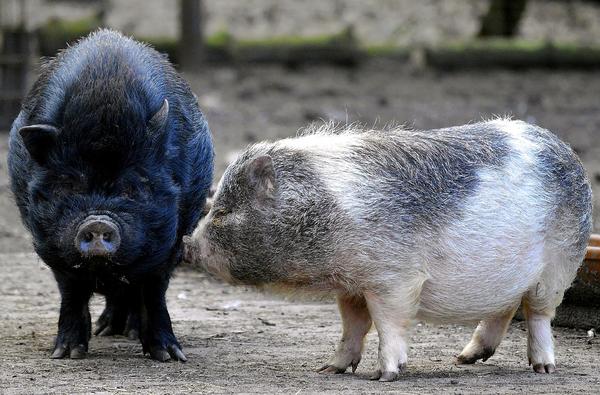
Do you smell that?
The pungent aroma of worry and uncertainty lingering in the air. 😟
It's only natural to feel concerned when it comes to keeping your precious pigs safe.
But don't fret just yet, my friend.
Keep reading to unravel the mystery of what pigs can't eat.
What Can Pigs Not Eat: A List of Toxic Foods
To keep your pigs safe, avoid feeding them these foods:
- Don’t give them unripened tomatoes.
- Raw potatoes and sweet potatoes are a no-no.
- Keep parsnips away from them.
- Celery and celery root should be off-limits.
- Watch out for parsley as well.
- Steer clear of onions.
- Avocados are a bad choice.
- Rhubarb is a big "no" too.
- Green potatoes contain solanine, so stay away from those.
- Laurel plants are toxic to both pigs and humans, so keep them away.
- Don't give them meat. 😷
But fear not!
There are plenty of garden delights your pigs can safely enjoy that are healthy and satisfying for them.
It’s crucial to provide a balanced diet for your pigs to keep them in tip-top shape and promote their all in all health and well-being.
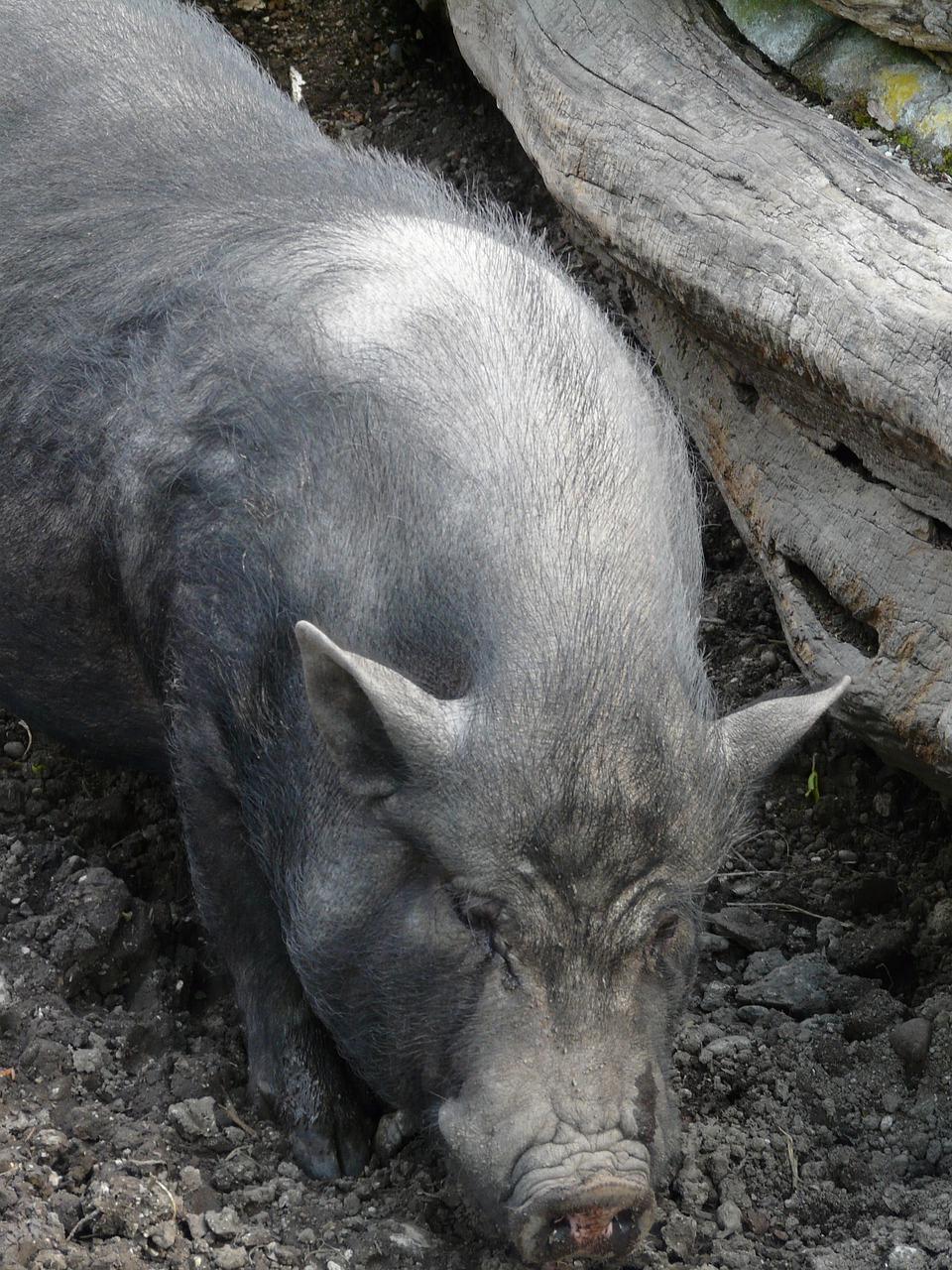
Always stay vigilant about what your pigs eat because certain foods can seriously harm them.
Stay informed and make responsible choices to ensure your pigs are always happy and healthy.
And now, let's dive deeper into the specific foods that should be avoided to ensure the safety and well-being of your pigs.
I want to highlight some additional items that can potentially harm them and discuss the reasons behind these restrictions...
Toxic Foods for Pigs: What to Avoid Feeding Them
Certain foods to avoid are a big no-no when feeding pigs.
These toxic foods can be harmful and even fatal for our porcine friends.
So, let's dive right into the list of what not to feed pigs:
- Laurels: Both humans and animals, including pigs, should stay away from laurel plants due to their poisonous properties.
- Moldy or stale food: It may seem obvious, but pigs should never be fed any old or moldy food as it can pose serious health risks.
- Meat: In many places, it is illegal to feed pigs meat. This is because pigs are not designed to digest animal flesh properly.
- Maple tree saplings: The impact of maple tree saplings on pigs is not well understood, so it's best to just avoid them altogether.
- Avocado skins and pits: These parts of avocados are toxic to pigs and can also present a choking hazard.
- Algae: Including algae in pig feed can lead to vomiting, coughing, frothing at the mouth, and muscle tremors.
But wait, there's more to know about what can harm our porcine pals.
From leftovers to fruit tree leaves, we'll uncover the hidden dangers that could jeopardize your pigs' health and well-being.
Let's dig deeper into these potential threats together!
Foods That Are Harmful to Pigs: A Comprehensive List
To ensure the health of your pigs, here is a comprehensive list of foods to avoid:
- Maple tree saplings
- Leftovers that are slimy, moldy, or rotten
- Vegetable roots and leaves
- Moldy, slimy, or rotten food
- Pear tree leaves
- Plum tree leaves
- Apricot tree leaves
- Cherry tree leaves
- Avocado pits and skins
- Chocolate
- Onions and garlic
- Raw potatoes
- Rhubarb leaves
- Chocolate
- Alcohol
- Caffeine
- Grapes and raisins
- Dairy products
Pigs have sensitive digestive systems, so when in doubt, it's best to err on the side of caution and not give them these foods. Always prioritize their health and well-being by providing them with a balanced and nutritious diet.
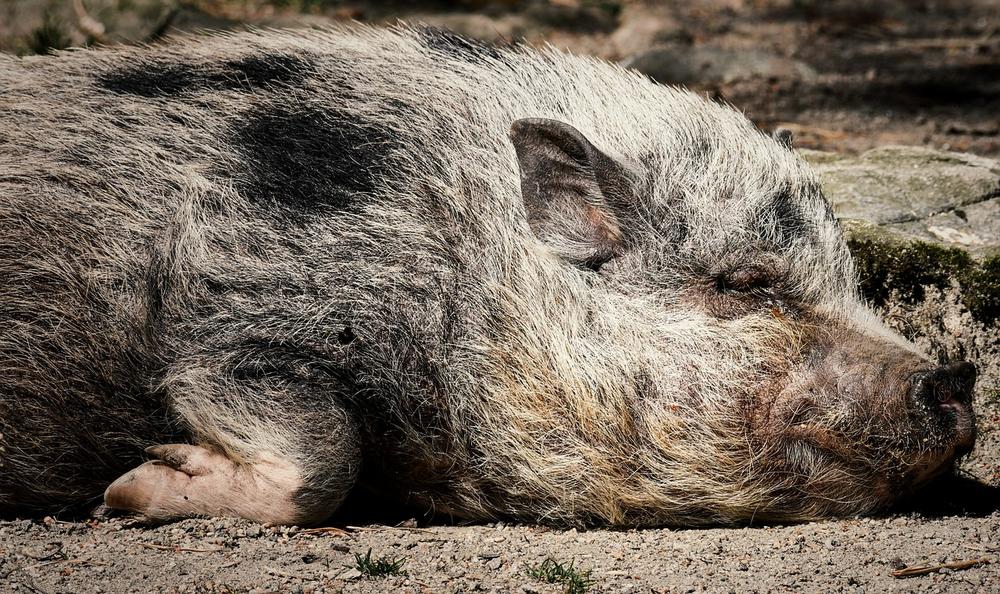
So, keep these points in mind and feed your pigs with proper care!
Harmful Foods for Pigs: What to Avoid Feeding Them
Avoid algae and meat in a pig's diet; they can be harmful, causing health issues and disease.
Pigs may experience vomiting, coughing, frothing at the mouth, and muscle tremors due to algae consumption.
Meat contains potential disease risk.
Also, remove buttercups from pig pastures as they are toxic.
To ensure pigs' well-being: prevent access to areas with toxic algae, refrain from feeding them meat, and protect them from contact with buttercups. By doing so, you maintain their health and vitality. Remember, keeping pigs safe and healthy is essential for their overall quality of life.
What Not to Feed Pigs: A Comprehensive List of Toxic Foods
There are specific foods you should not give pigs when it comes to their feeding.
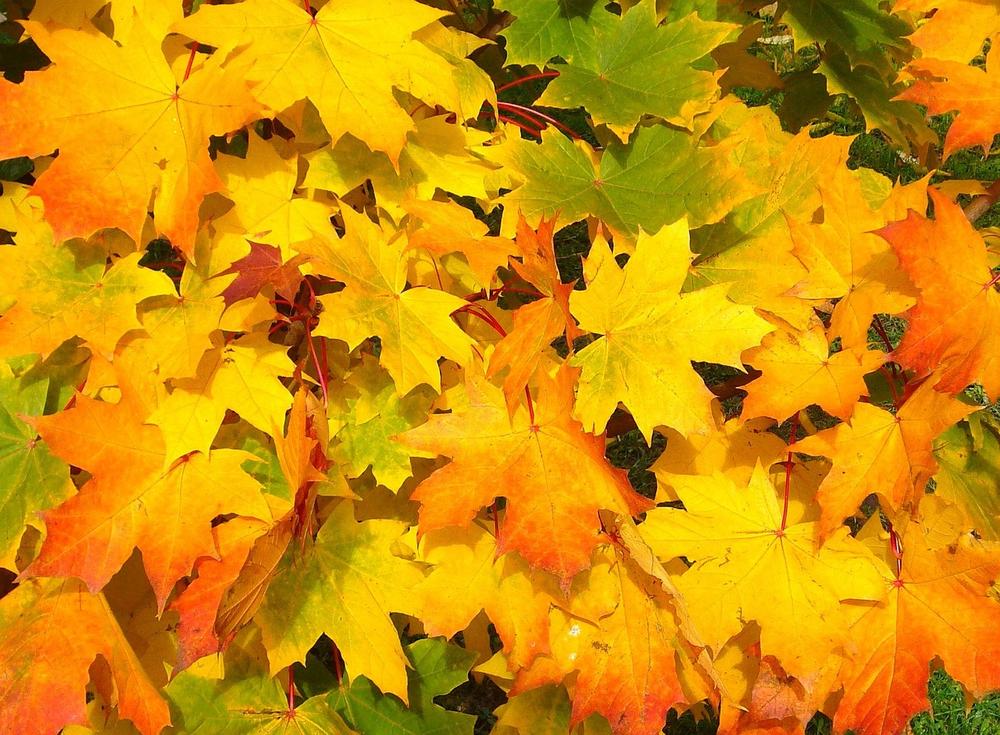
Here's a comprehensive list of toxic foods for pigs:
- Fruit tree leaves from pear, plum, apricot, and cherry trees can be toxic. Make sure to remove these leaves before feeding any fruit or leaves to pigs.
- Watch out for wild mushroom areas, as death cap mushrooms can be fatal for pigs.
- Pigs should not consume apple seeds, as they can be poisonous if consumed in large quantities.
- Root vegetables like broccoli plants should not be fed to pigs, including the roots and seeds.
- Pigs should steer clear of plants like ivy and buttercup, which can be harmful if ingested.
- Avoid feeding pigs near rusty tools, as they may contain harmful substances that could be harmful to pigs.
- Ponds with toxic algae should be avoided by pigs.
While pigs enjoy apples, it's best to avoid the seeds and follow these guidelines to ensure their health and safety.
Pigs and Toxic Foods: What You Should Never Feed Them
To ensure the health and well-being of your pigs, be aware of these vital tips:
- Remove toxic plants like buttercups from pastures where pigs graze.
- Seek immediate veterinary treatment if your pig gets bitten by a snake.
- Detect diseases such as Foot and Mouth Disease (FMD) and African Swine Fever (ASF) early.
- Strict quarantine and biosecurity measures are implemented in Australia, but there is still a risk of infected products entering the country.
- Report any suspicious or potentially harmful feeding practices to local veterinarians or livestock biosecurity officers.
- The Agriculture and Food division of the Department of Primary Industries and Regional Development is dedicated to protecting Western Australia's agriculture sector.
You can ensure the safety and good health of your pigs by taking these precautions and remaining watchful.
Remember, their well-being relies on your care and attention.
So, take the necessary steps to prevent any harm or risks that may come their way.
Your pigs will thank you for it!
Dangerous Foods for Pigs: What Not to Feed Them
Pigs will eat pretty much anything, but not everything is good for them.
Here are some foods you should avoid giving pigs:
- Don't feed them moldy or spoiled food because it can make them sick.
- Keep poultry products like chicken bones and skin away from pigs because they can easily choke on the bones and the fatty skin doesn't sit well with their digestive system.
- Dairy products such as cheese, yogurt, and milk might seem harmless to you, but pigs struggle to digest lactose, which can give them upset stomachs and diarrhea.
- Even though onions and garlic are healthy for us in small amounts, they can actually cause anemia in pigs if eaten regularly.
- Stay away from caffeinated drinks like coffee, tea, and energy drinks because they can speed up a pig's heart rate, leading to heart problems and possibly death. So be sure to keep your cup of joe out of reach from these little piggies.
- And finally, avocados are a no-go! As much as we love them, they have a toxin called persin that can harm pigs. 🐷
Pigs have delicate bellies and specific dietary requirements.
To keep them healthy, you have to provide them with a balanced diet.
And while you should know what foods are toxic for pigs, it is equally key to take precautions to prevent them from accessing lead-painted surfaces or old tools, which can result in lead poisoning...
Pig Diet: Foods to Avoid for Optimal Health
To ensure optimal health, it is best to avoid certain types of food when feeding pigs.
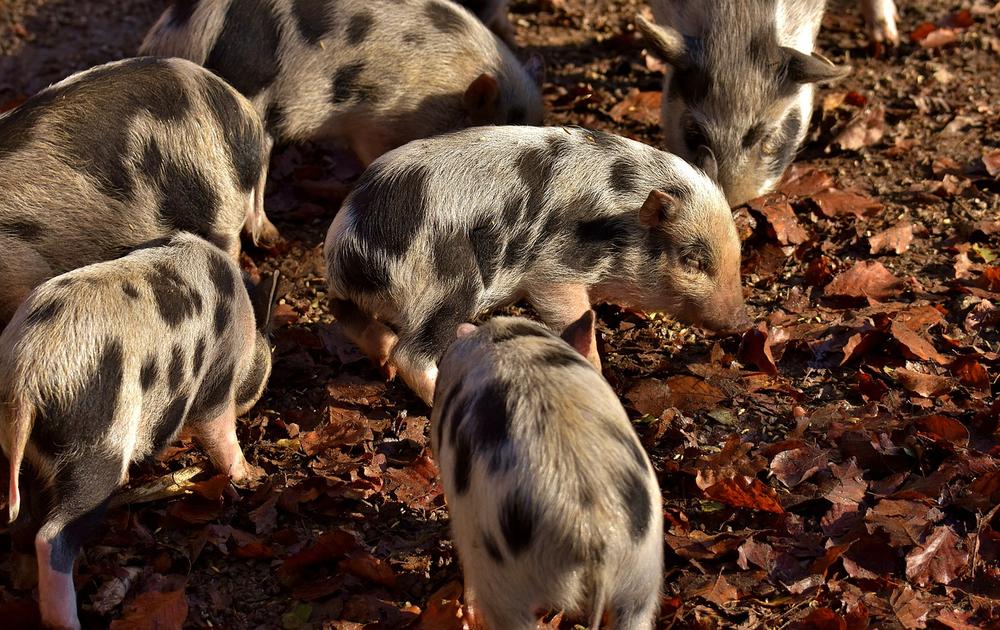
Here's a practical list to help you keep your pigs healthy:
- Salt and sugar: Pigs should avoid consuming foods high in salt or sugar content as it can lead to health issues.
- Raw eggs, chicken, and other raw meat: These foods can pose a risk of disease transfer to pigs, so it's best to steer clear.
- Contact with meat: Pigs should not have any contact with meat as it can make them sick.
- Pesticides: Caution is necessary while using pesticides around pigs as they can be fatal.
- Foot-and-mouth disease and African swine fever: These diseases can have severe consequences, so precautions should be taken.
- Ill-health or unexplained deaths in livestock or feral pigs: Any signs should be reported to prevent the spread of diseases.
- Food scraps in areas with feral pig presence: Access to food scraps should be prevented to maintain proper dietary control.
- High sodium foods or feed meant for other animals: Their diets should be low in salt and sugar, avoiding these foods.
- Avoid certain fruits and crops like potatoes and sweet potatoes: These require caution when feeding pigs.
- Balance their diet with pig pellets and healthy vegetables: A balanced diet consisting of 80% pig pellets and 20% healthy vegetables will ensure proper nutrition.
It is strictly prohibited to feed meat or contaminated food to pigs, and violations can result in fines and prosecution.
Conclusion
Key Takeaways:
- Avoid feeding pigs meat to prevent sickness and disease.
- Pigs can eat a variety of garden items, excluding certain vegetables.
- Moldy or stale food should be avoided.
- Do not feed pigs avocado skins, pits, or algae.
- Leftovers can be harmful and should be avoided.
- Certain fruit tree leaves are toxic for pigs.
- Beware of toxic plants like laurel, buttercups, and ivy.
- Avoid wild mushrooms and snake bites can be dangerous.
- Early detection of diseases like FMD and ASF is crucial.
- Avoid feeding pigs raw meat, eggs, and prohibited pig feed.
- Pigs should not consume foods high in salt or sugar.
- Be cautious with pesticides and lead exposure.
- Balanced and varied diet is essential for pigs.
- Avoid feeding pigs meat or contaminated food in Australia.
- Violations can lead to prosecution and fines.
And that's all for today folks.
Before you leave, can I ask you something? Did my blog post help you out? If it did, I would be so grateful if you could share it with your loved ones. You can effortlessly share it by clicking on any of the social media icons. Thank you so much!
Until next time,
-Chris Campbell